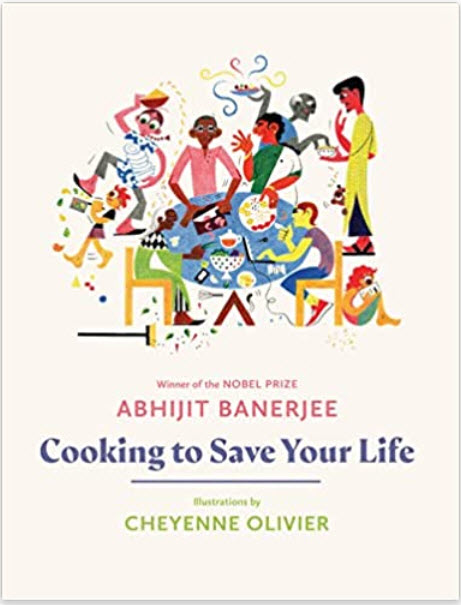Sinds begin deze week ben ik de fiere en dankbare bezitter van Cooking to Save Your Life van Abhijit Banerjee.
Cooking to Save Your Life is een kookboek, maar niet zo maar een.
Het boek is onder meer bijzonder omdat het, hoewel hier al gesignaleerd, voorlopig enkel in Indië, Pakistan, Sri Lanka, Bhutan, Nepal en Bangladesh te koop is. Ik kon niet achterhalen waarom dat zo is. Via een Indische online vriend van Georgia is het me toch gelukt om het geleverd te krijgen. Dat maakt het op zich al speciaal.
Nog specialer is de auteur: Abhijit Banerjee (1961) is de in Indië geboren maar in de VS werkende economist die samen met zijn echtgenote Esther Duflo in 2019 de Nobelprijs Economie kreeg voor hun experimentele benadering om wereldwijde armoede te verlichten. Banerjee en Duflo pionierden onder meer in de toepassing op armoedeproblemen van Randomized Control Trials (RCT’s).
Banerjee is niet de enige economist die met voeding en koken bezig is. Mijn favoriete blogger Tyler Cowen schrijft regelmatig over eten en drinken. Hij heeft ook een bijzonder neus voor vooral exotische restaurants in steden wereldwijd en hij signaleert de vondsten op zijn blog (hier is Gent).
Cowen schreef ook een boek An Economist Gets Lunch: New Rules for Everyday Foodies, maar dat is geen kookboek, eerder een boek met tips om goede eetplaatsen te vinden.
Van een andere Nobelprijswinnaar, Paul Romer, is het bekende kookgerelateerde citaat “Human history teaches us, however, that economic growth springs from better recipes, not just from more cooking. New recipes produce fewer unpleasant side effects and generate more economic value per unit of raw material.”
Voor Banerjee zijn er verschillende linken tussen zijn kokerij en zijn bezigheden als economist:
As I started to think of how to frame the book, I began to notice the extent to which my sensibilities about cooking were connected to my instincts as an economist and a social scientist. …
Economists are trained to think about how to make the most of limited resources, and that instinct drives what we do in the household as much as anywhere else.
Het gaat verder dan enkel economische efficiëntie:
The tone I have tried to strike aims at lightness, but both food and cooking are so obviously tied to political and social structures that it would be odd to try to avoid them, and I have not: the themes of poverty and inequality, want and need, conservation and climate change, power and gender, self-expression and conformity keep coming back and each chapter has an introduction that tries to make explicit those connections to the recipes I have chosen.
Maar men weze ook gewaarschuwd:
I also have an embarrassing admission to make. This book is written the way I cook – expensively.

De titel van het boek, Cooking to Save Your Life, kan de indruk wekken dat er vooral “gezonde” recepten in staan. Maar daar eet Banerjee te graag voor.
De verklaring van de titel ligt elders:
Many people have told me that they cannot cook to save their lives. I don’t believe them. A lot of them can build a dresser out of an Ikea box – despite the fact that the instructions read like they were written by a visually impaired robot. How could it be possible that they are not able to follow a simple set of instructions.
Esther Duflo doet een cameo met haar recept voor mayonnaise.
Het boek bevat geen foto’s, maar is heel charmant geïllustreerd door Cheyenne Olivier.
Hier is een amusant interview met Banerjee en Olivier over het boek.